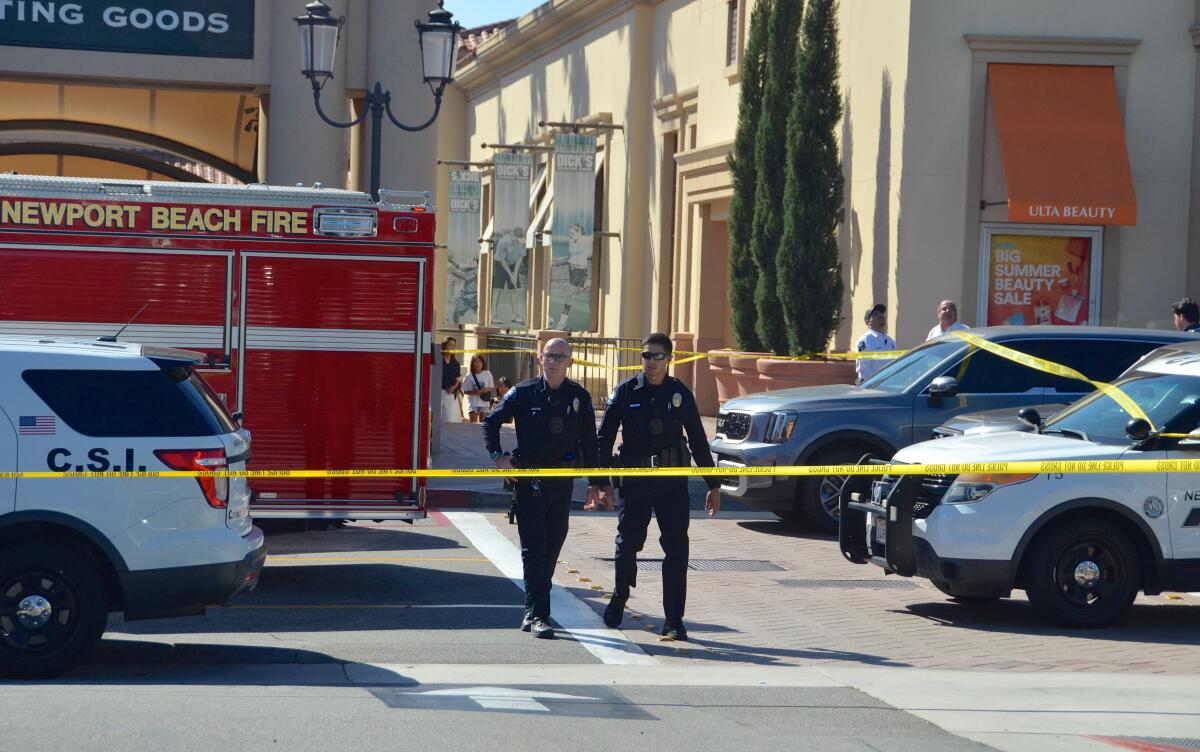Newport Beach City Council endorses Prop. 36, harsher penalties for theft and drug crimes

- Share via
The Newport Beach City Council adopted a resolution at its meeting on Tuesday in support of Proposition 36, a measure on the November ballot that purports to tackle homelessness and drug addiction by imposing harsher penalties against people convicted of retail theft or trafficking fentanyl.
The resolution backing the proposition was recommended by Mayor Will O’Neill and Councilman Erik Weigand. Its passage came packaged with the meeting’s consent calendar and was unanimously approved without comment from members of council or the public.
Newport Beach is the latest among a handful of communities that have formally come out in support of the proposition. Huntington Beach’s City Council adopted a similar resolution in August. It has also been endorsed by the California Sheriff’s Assn., the California Republican Party and the California District Attorneys Assn., an organization whose members are mostly prosecutors. Major donors funding the effort include large retailers like Walmart, Target and Home Depot.
People behind the measure say it is needed to curb the spread of the powerful opioid fentanyl and to tackle an alleged “explosion of retail and cargo theft” in recent years. Opponents, including the California Democratic Party, the League of Women Voters and California Attorneys for Criminal Justice (made up of mostly defense attorneys), along with California’s Legislative Analyst’s Office, say it would drastically increase the state‘s prison population and cost taxpayers hundreds of millions of dollars annually.
The measure would alter and reverse portions of Proposition 47, a set of laws passed in 2014 designed to alleviate overcrowding in prisons by reducing some nonviolent felonies to misdemeanors. Supporters of Proposition 36 claim that softening penalties for certain crimes 10 years ago encouraged people to commit them more often.
Proponents of the ballot initiative say it would tackle retail theft by essentially reinstating a “third strike” rule for the crime, meaning anyone with two prior convictions for stealing would be eligible for felony charges in subsequent cases regardless of the value of goods taken. Previously, under Proposition 47, all theft cases valued under $950 were classified as misdemeanors.
Thieves in a “smash-and-grab” heist at a jewelry store in Newport Beach ran off with about $250,000 in merchandise last September. In July, a woman was killed after she and her husband became the victims of a robbery at Fashion Island.
Proposition 36 calls for harsher penalties against convicted drug traffickers who either possess firearms or sell an illicit substance that winds up injuring someone. It also specifically categorizes fentanyl as a hard drug and would require people found guilty of selling it to be warned that they could be charged with murder if their merchandise kills a person.
The ballot measure would also create a new class of offenses called treatment-mandated felonies. This would make people with two prior convictions for the possession or hard drugs illegible for a felony charge upon future arrests. People convicted a third time would be given the option to enter addiction and mental health treatment program to avoid jail time.
Although the ballot initiative features language calling for more treatment and support services for those dealing with addiction or mental health conditions, it does not contain provisions outlining how those would be funded. Those campaigning against Proposition 36 claim it would actually make it harder to access treatment because it would divert funds away from state programs in order to pay for an increased workload in California’s court and prison systems.
By comparison, the passage of Proposition 47 came packaged with the establishment of the Safe Neighborhoods and Schools Fund. That program repurposed the money the state saved as a result of reducing the prison population and prosecutor caseloads to pay for mental health services, substance use disorder treatment and diversion programs for those in the criminal justice system.
Gov. Gavin Newsom and other Democratic lawmakers proposed an alternative measure to compete with Proposition 36, but that effort lost steam shortly after it was announced.
All the latest on Orange County from Orange County.
Get our free TimesOC newsletter.
You may occasionally receive promotional content from the Daily Pilot.






